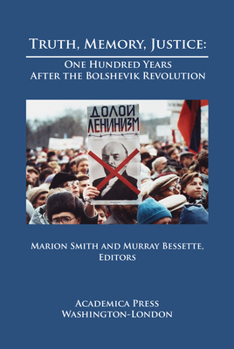Truth, Memory, Justice: One Hundred Years After the Bolshevik Revolution
Over a century ago, a small group of Red Guards seized the Winter Palace in the Russian capital of Petrograd (St. Petersburg) and installed the world's first communist government. The Bolshevik Revolution marked the beginning of a century in which adherents to communist ideology committed some of the worst and most widespread atrocities known to history. The founding of the Soviet Union inaugurated a century of political turmoil around the globe by pioneering, in spectacular fashion, a new model of political, economic, cultural, and institutional revolution. It was a model that, for decades, exercised considerable fascination and influence over the minds of elites and common people around the world--both through attraction and revulsion. The Soviet Union's influence was not restricted to the world of ideas. Through revolution, war, and conquest, the Soviet model was exported to the USSR's imperial sphere in Europe and found imitators in Asia, Africa, and Latin America, some of which still hold power. Today, while the Soviet state created by the Bolsheviks has collapsed, the Revolution's aftereffects are still visible in Russia and the other former states of the Soviet Union that grapple with the political, social, economic, and geopolitical realities of incomplete transitions to democracy and free enterprise within a rule of law system. Beyond the former USSR, one-fifth of the world's population lives under a single-party communist regime in the People's Republic of China, Cuba, Laos, Vietnam, and North Korea. The enduring importance of the communist experience means the study of the Bolshevik Revolution continues to be necessary--and makes the observance of the centenary of the Bolshevik Revolution a particularly appropriate time to take stock. On November 7-9, 2017, the Victims of Communism Memorial Foundation convened a major conference in the halls of the Library of Congress as part of the Victims of Communism Centennial Commemoration. In seven panel discussions, an impressive array of academics, practitioners, and public servants discussed topics including the history of the Bolshevik Revolution; the Marxist ideology that drove it; the Soviet Union's economy, politics, and foreign policy; its influence around the world; and the struggle to reckon with the past through historical and public memory. This volume contains the proceedings of that conference, as well as a window into the rich intellectual exchange occasioned by this meeting of minds. Nearly all the original panelists' remarks are reproduced here. The editors have also included a selection of moderators' remarks and discussion session comments that are especially pertinent. The papers of two additional authors who were unable to attend in person--Paul Goble and Sir Roger Scruton--are also included.
Format:Hardcover
Language:English
ISBN:1680530739
ISBN13:9781680530735
Release Date:May 2019
Publisher:Academica Press
Length:301 Pages
Weight:1.25 lbs.
Dimensions:1.0" x 6.1" x 9.1"
Customer Reviews
0 rating





